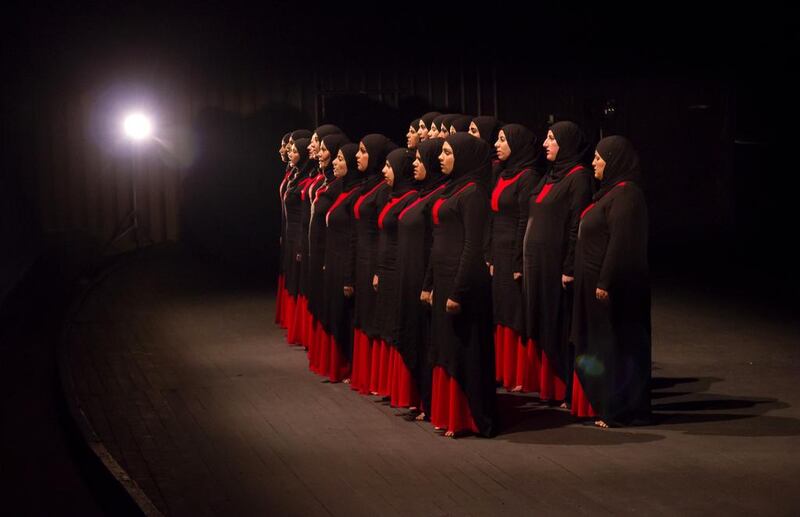The pen is mightier than the sword, so the saying goes. In Lebanon, Zeina Daccache is trying to overcome modern warfare’s guns, shells and barrel bombs, armed with nothing more than an arsenal of therapeutic theatre techniques.
Since 2011, more than three million Syrians have fled their homeland to escape the continuing violence. In Lebanon, theatre techniques are being used as a means of empowering these displaced people, both intellectually and psychologically.
In a society where therapy is taboo, drama workshops serve as a socially acceptable means for refugees to talk about their experiences and emotions. Amid growing tensions between displaced Syrians and their Lebanese hosts, theatre productions also allow refugee voices to be heard by a wider public.
Daccache, founder of the NGO Catharsis and the pioneer of drama therapy in Lebanon, has been forging bonds and healing wounds through weekly workshops for a mixed group of Syrian and Lebanese women since April last year.
Daccache, who trained in the United States, has won acclaim for her work with marginalised groups in Lebanon. The Syrian and Lebanese women she is working with have spent the last 10 months doing exercises designed to encourage them to open up and share their problems, joys and experiences.
The workshops weren’t advertised as therapy, Daccache explains. “We describe it as expressive working using theatre ... Me, if you tell me it’s therapy, I will not go — it’s scary,” she admits with a laugh.
No one is pressured to speak until they feel ready, she explains, but the exercises are designed to promote bonding and elicit empathy. For example, a woman who frequently fights with her husband about their children’s education might describe an argument. Other participants will then enact the scene multiple times, exploring alternative responses and ways of engaging. “Doing group therapy you can fall easily into, ‘Oh, I would advise you to say this,’” says Daccache. “Talking is very easy. Putting it into action on stage is not.”
After close to a year of workshops, the women are ready to begin preparing for a public performance. Scheduled to be staged this summer, the production will be an original work, based on the participants’ own stories and experiences.
The play will offer these women a chance to share their stories with the public. In the meantime, the workshops are overcoming the divides that separate Lebanese and Syrian women.
“There is a lot of prejudice between Lebanese and Syrians,” Daccache says. “We find common ground and the differences become a richness in the group … There is no more differentiation between Muslim and Christian, Syrian and Lebanese, or whatever.”
The success of the project echoes a similar one in Beirut late last year: a production of Antigone, featuring 23 Syrian refugee women living in Beirut.
The play featured the women’s own stories and was narrated by 28-year-old Mona, whose son died of cancer at the age of 5. The harrowing story of how she risked her own life to bury him in an unmarked grave in war-racked Syria formed one of the most powerful sections of the performance.
The parallels between Mona’s experience and that of Antigone, the brave, rebellious heroine of Sophocles’ tragedy, are striking. Antigone defies her uncle Creon, the king, on whose orders her brother’s body has been left as carrion for the vultures. To secure her sibling’s burial, she forfeits her own life.
Antigone was the culmination of an eight-week series of drama workshops organised by Aperta Productions, an NGO cofounded by Syrian filmmaker Itab Azzam and American actor Hal Scardino. “We really wanted something about women being strong and making decisions and taking stands,” explains Azzam, “and Antigone is perfect for that.”
Syrian director Omar Abu Saada and playwright Mohammad Al Attar worked with the cast to combine elements of the pre-existing script with true stories of the flight from Syria, the loss of homes and loved ones and the grim realities of day-to-day life as a refugee.
“It is a form of therapy, but it doesn’t follow the same rules as dramatherapy,” Azzam says. “This was more like a professional theatre production with a therapeutic aim. The long process of three months of sitting down and sharing stories is definitely therapy, but the final production also meant that the women had a goal, and achieving that goal was in itself therapeutic.”
None of the women who took part had ever performed before, but Aperta Productions paid them a wage, just as they would professional actresses. “I insisted that we pay them, because they are in a terrible financial situation,” Azzam explains. “Helping them financially helps psychologically at the same time. Most of them had never worked before in their lives, so they felt an increase in confidence by bringing money to their families.”
But the opportunity to share their stories with the Lebanese public was the primary motivation for most of the women. “They said this is the first time they did something that made them feel human again,” says Azzam, “because being refugees has dehumanised them in a way.”
artslife@thenational.ae





